

DEMENTIA: THE PERSONAL AND COMMUNITY IMPACT LIFESTYLE DIET VS EXERCISE Summer 2024 Priceless Pass me on for a greener Bermuda HEALTH, FITNESS AND BEAUTY TIPS

» Free Prescription Delivery
» MDS Blister Packaging Service
» Compounding Pharmacy Service
» Over-The-Phone & Online Prescription Refill Service
» Special Order Service For Medications
» Medication Reviews & Usage Counselling
» On Call Express Glucometer & Supplies 100% Covered by Argus & BF&M
» Certified Covid-19 Antigen Testing Service
» Prescriptions & Over-The-Counter Medications
» Healthy Lifestyle Advice
» Health & Beauty Aids
» Vitamins & Supplements
» Dental & Optical Care
» Seniors Save Wednesdays
» Charge Card & Gift Card Service
» Open Daily & Holidays
» 8 Convenient Locations Island-wide



Dispensary Address Telephone Facsimile The Phoenix Centre 3 Reid Street, Hamilton HM 11 295-0698 295-2636 Woodbourne Chemist 1 Gorham Road, Pembroke HM 08 295-1073 292-0230 Clarendon Pharmacy 31 Victoria Street, Hamilton HM 10 295-9137 292-2265 King Street Pharmacy 38 King Street, Hamilton HM 11 279-5101 279-5102 Collector’s Hill Apothecary 2 South Road, Smith’s FL 08 279-5512 236-9054 Paget Pharmacy Rural Hill Plaza, 130 South Road, Paget PG 06 279-5510 236-9057 Warwick Pharmacy 49 Middle Road, Warwick WK 05 279-5556 236-8625 Dockyard Pharmacy Royal Naval Dockyard, Sandys MA 01 279-5515 279-5528 EIGHT CONVENIENT LOCATIONS Visit The Phoenix Stores today. www.phoenixstores.bm DO YOU KNOW ABOUT OUR SERVICES?
OUR PRIORITY YOUR HEALTH

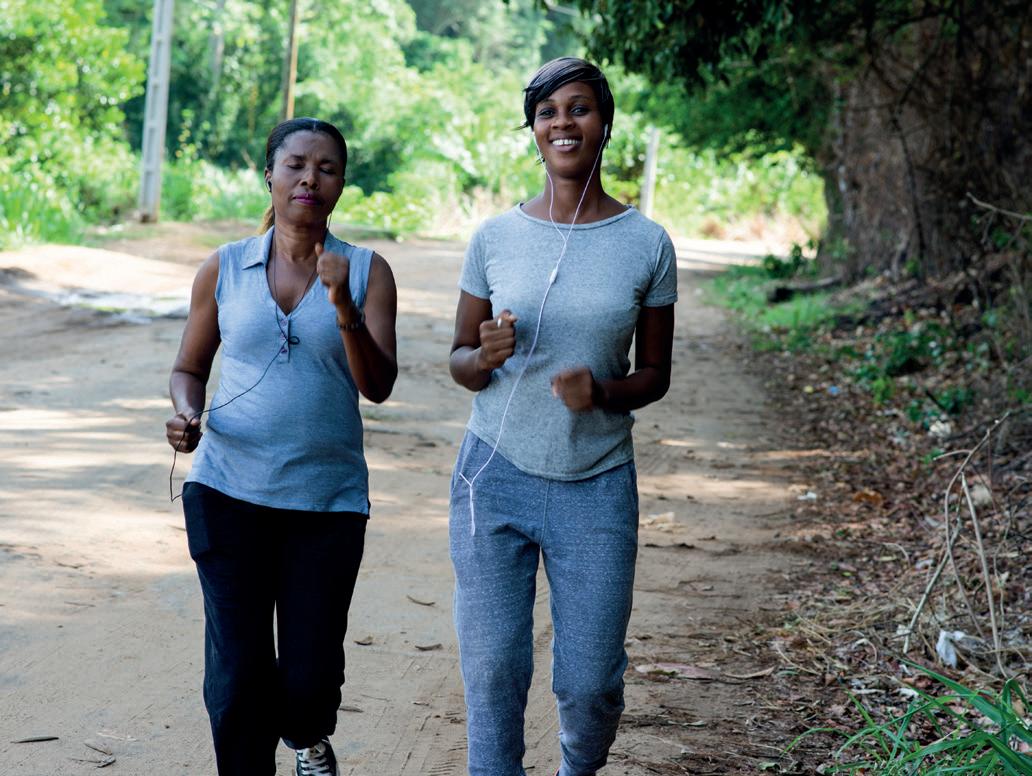
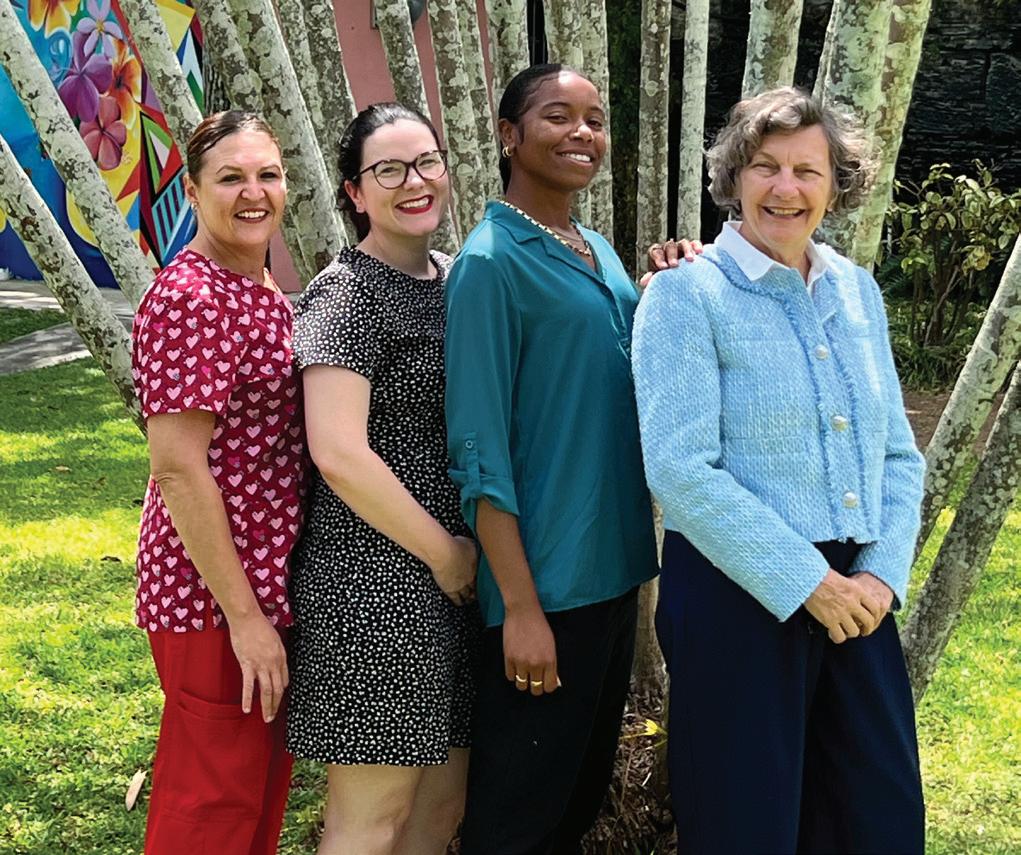
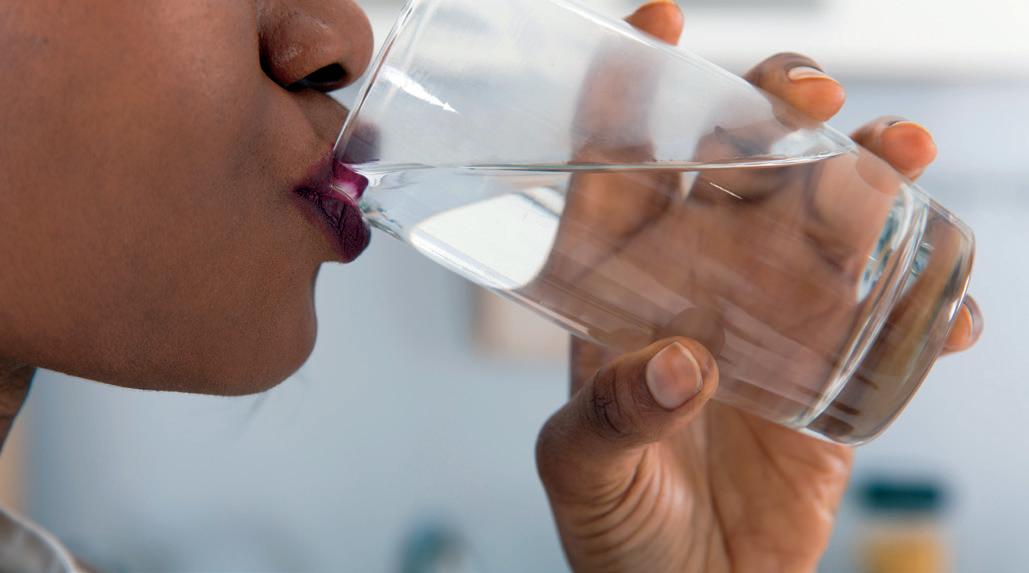
Health & Beauty Summer 2024 3 Publisher Ian Coles Director of Marketing Lissa Fisher Art Director Tim Parker Editorial Contributions: Tim Smith Editorial, Advertising & Distribution: PO Box HM 2032, Hamilton HM HX, Bermuda. Tel: (441) 292-7279 Email: hello@bm.bm Website: http://www.bermudamedia.bm Health & Beauty 2024 is published biannually by Bermuda Media. © 2024 Bermuda Media. All rights reserved. No part of this publication may be reprinted or reproduced without the written permission of the publisher. Associated media include Bermuda Business Visitor Your Future New Resident Guide Building Bermuda Going Green Your Office Bermuda Property Matters Bermuda Channel House Garden Kitchen & Bath Diversity, Equality & Inclusion 4 Smoothies 6 Cancer care 7 Summer skin care 8 Dementia: the personal and community impact 12 Reef safe skin care 13 15 years of homecare 14 Diet vs Exercise 14 9 13 5 CONTENTS
My favourite Smoothie
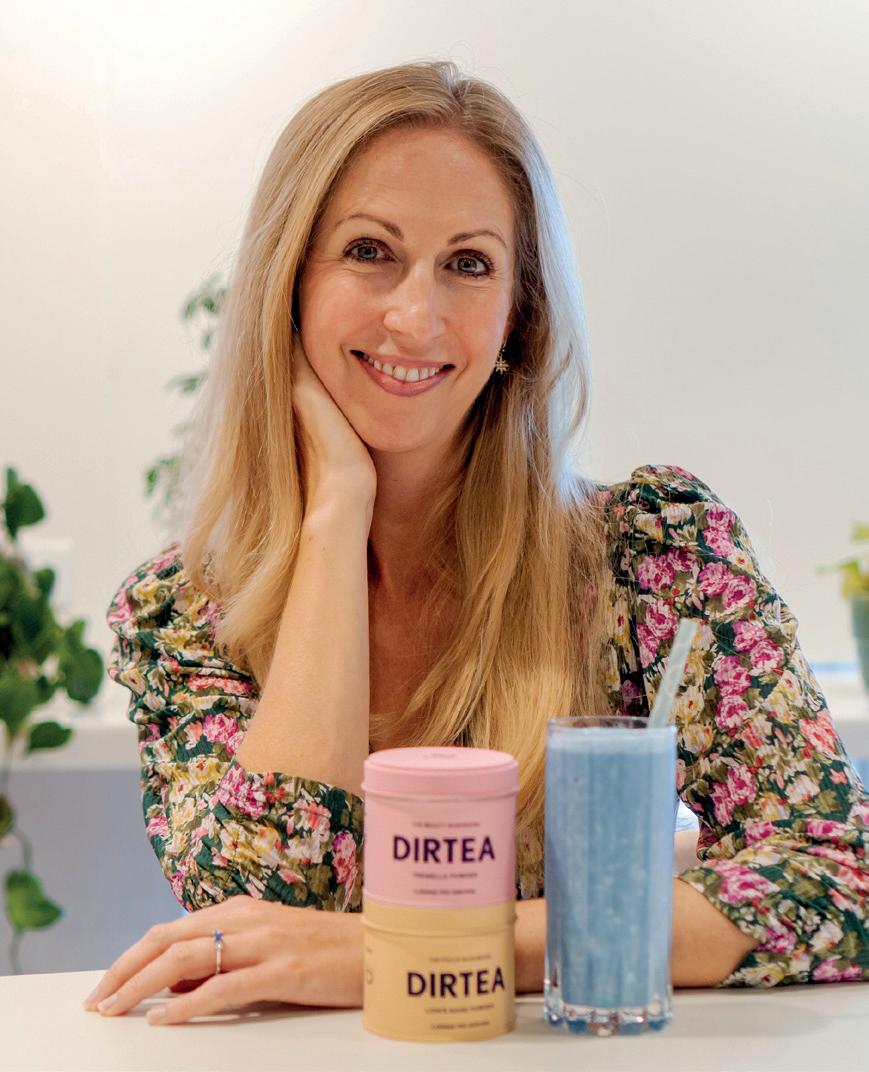
I’ve been on a blue-smoothie streak recently as I love the antioxidantrich and anti-inflammatory properties of Blue Majik spirulina. Pick yours up at Miles or The Cloud, or make your own at home. Try adding some DIrtea functional mushroom powder too for an extra boost. However you make yours, be sure to add a decent source of protein to steady sugar release from the fruit. That way you’ll have more, longerlasting energy.
CATHERINE BURNS
Nutritional Therapist, BA Hons, Dip ION, mBNTA
AVP Nutrition, Wellness & Community Health
Waterfront Wellness
MORE HELPFUL TIPS HERE!

Herbalife: Weight and Wellness

Herbalife Nutrition offers products designed to support weight loss, weight gain or maintenance, as well as products to help balance one’s diet, and address nutritional gaps. Herbalife has been in the market for almost half a century and is sold to almost every country worldwide. It has built a reputation for being an effective partner for health goals. And I can attest to that. Herbalife has helped me lose almost 60lbs — from 318lbs to 260lbs. It is a change that gave me confidence and made me feel good about myself. Now we would like to introduce Herbalife’s plant-based protein powder, a 100% vegan option. Here at Latte’s we promote healthy and happy lifestyles, come see us!
Health & Beauty Summer 2024 4 MY FAVOURITE SMOOTHIES
ROYCE BULATAOROYCE BULATAO
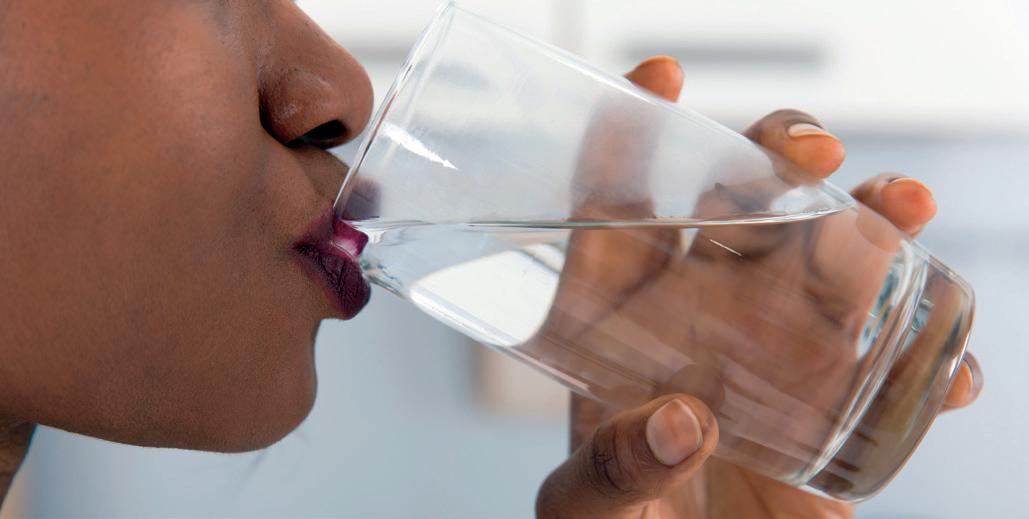
Choose Water
Sugar is a carbohydrate and occurs naturally in fruits, vegetables and dairy products. Too many carbohydrates can lead to weight gain mainly due to extra calories in the diet. Sodas and other beverages are some of the main culprits of “added sugar”. There are profound health implications related to excess body fat. Being overweight increases your risk of high blood pressure, heart disease, stroke and diabetes. Drinking water is a healthier alternative to sodas. It allows you to hydrate without the sugars. Fruits like limes and lemons can be added to enhance the flavour. Sparkling water is a great option if you miss the carbonation of sodas. Always read the labels on the water you purchase since all waters are not created equal. There is a time to indulge in the sweeter side of life. However, balance things out with a refreshing glass of water. It does a body good, pure and simple. www.bwl.bm



MONDAY - FRIDAY: 8 a.m. – 5 p.m. (OFFICE, RETAIL SHOP & DRIVE THRU) SATURDAY: 9 a.m. – 1 p.m. (DRIVE THRU ONLY)

5 Health & Beauty Summer 2024 HEALTH
Improving the quality of life for cancer patients
Forty years ago, cancer was a word hardly spoken aloud in the community. Patients were isolated for fear of contamination, and families were even afraid to use the same utensils.
PALS began with a group of volunteer nurses to assist in getting patients home from the hospital with cancer. These patients needed a “pal,” someone to sit with them, read to them, or perhaps feed them. Robert Stigwood, a wellknown music entrepreneur, film producer, and a Bermuda resident, provided funding for two years for a part-time nurse.
Today, Bermuda’s only home cancer care charity has grown to include six specialised nurses, a palliative care physician, and a medical social worker who all see approximately 200 patients a month.
PALS supports all patients with cancer at any stage

of the disease. Some of its patients complete their cancer treatment and no longer require its specialised services; others require palliative care for pain and symptoms experienced with end-of-
life care. PALS continues to support the patient and his or her family medically, emotionally, and financially.
In addition to nursing support, PALS offers durable medical equipment to its
patients, including such items as hospital beds, commodes, shower benches, and wheelchairs, all free of charge. PALS will assist patients (on an individual basis once financially screened) that require assistance with purchasing food supplements, medications, and overseas medical travel for uninsured and underinsured patients.
PALS receives no government grants and relies solely on corporate and individual donations, various fundraising events and its thrift shop, to continue to support its programmes.
PALS spends more than $6,000 a day on patient care, and its annual budget is slightly over $2 million. PALS never charges a patient or his or her family for its services. All support financially and through volunteering is greatly appreciated. www.pals.bm

6 Health & Beauty Summer 2024 CANCER
PALS nurses: L-R Reanna Stovell, Rosa Ward, Waynette, Wilson, Kathy Fox, Merlyn Burgess
Protecting your health during summer fun
John Bentley, Pharmacist with The Phoenix Stores, provides some important tips to keep you safe in the sun
Summertime in Bermuda is the perfect time for you and your family to enjoy the outdoor activities, sunshine and fresh air. Here’s some simple measures to help you stay healthy and safe while enjoying the great weather to the fullest.
Sunburn
Being out in the sun has many health benefits, but if you were having too much fun in the sun that you forgot to reapply your sunscreen, you risk sunburn.
Sunburn is skin damage caused by ultraviolet (UV) rays and usually causes the skin to become red, sore, warm, tender and occasionally itchy for about a week. When burnt, the skin will normally start to flake and peel after a few days, and will usually fully heal within seven days. While sunburn is often mild and short-lived, it’s important to try to avoid being sunburnt, as it can increase your chances of developing serious health problems, such as skin cancer, in later life.
If the sunny weather has caught you out and you’re suffering, here are some ways to relieve and treat sunburn. Find shade. Applying more sunscreen won’t reverse sunburn no matter how much you use. If you’re burnt, get out of the sun and seek shade as soon as possible.
Cover up. Wear cool, loose clothing that won’t rub or chafe your skin. It’s important to cover sunburnt skin from direct sunlight until the skin has fully healed.
Stay hydrated. In hot weather, staying hydrated is always vital, especially if you’re sunburnt, so drink plenty of fluids. Oral rehydration solutions such as Nuun hydration tablets or Diarolyte sachets containing essential electrolytes may help replace the loss of fluid and body salts quickly. Apply afterburn. Designed to cool, soothe and help sunburnt skin heal, afterburn treatments, often packed
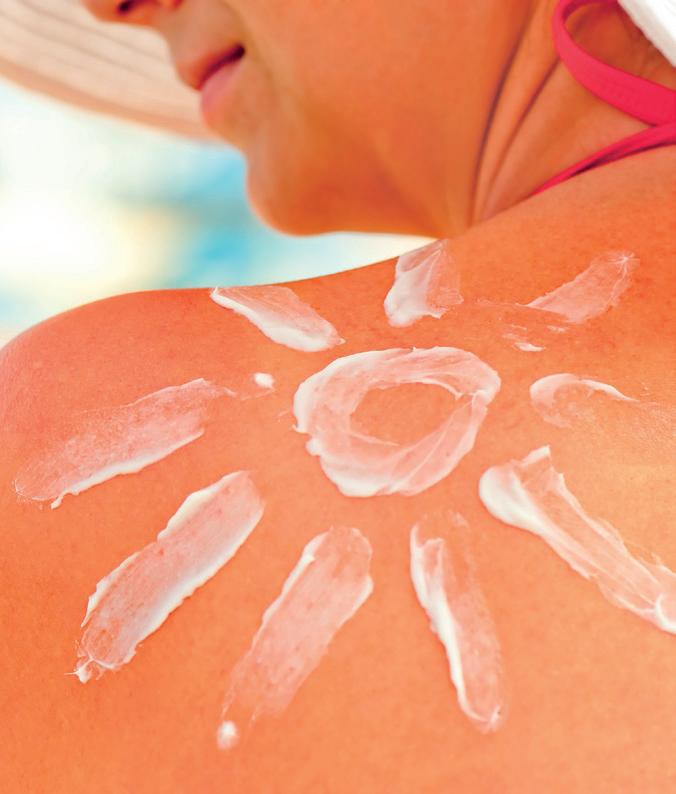
with cooling aloe vera, are particularly calming. Try keeping it in the fridge for an extra cooling effect.
Take a cool bath. Relieve your skin with a cool shower, bath or damp towel to help ease the burning sensation — but don’t put ice or ice packs on sunburnt skin as it can cause further pain and damage. Take pain relief. Pain killers such as acetaminophen and ibuprofen may help alleviate sunburn pain and reduce swelling and redness. If your sunburn is also itchy, you can try an overthe-counter steroid topical such as hydrocortisone cream.
Although mild sunburn can be treated at home and usually gets better on its own, you should consult your doctor if your skin has blistered or become swollen, your temperature is very high or you’re concerned you have heat stroke. You should always contact your doctor for advice regarding a child or baby with sunburn.
Which sunscreen?
Prevention is always best when avoiding skin damage, so before heading to the beach, park, or out on the water, remember that a decent sunscreen is non-negotiable.
Which one is right for you with so many sunscreens to choose from these
days? There are a few things to consider when picking a sunscreen and knowing how to use it correctly to ensure optimal results.
Choose the right SPF. SPF stands for sun protection factor and refers to the level of protection from UVB radiation linked to cancer. In Bermuda, it is advisable to wear an SPF factor higher than 30 to protect the skin.
Make it five stars. Choose a broadspectrum sunscreen that has a four or five-star UVA rating. Broad-spectrum means the sunscreen protects against both UVA and UVB rays. Apply. Apply. Apply. Research has shown that the best sunscreen protection is achieved by application 15 to 30 minutes before exposure, followed by a reapplication 15 to 30 minutes after exposure begins. Reapply at least every two hours and immediately after being in the water, even if your sunscreen is water-resistant. Application varies based on the indications and protection factor shown on the label — from as little as 80 minutes in water to a few hours, depending on the product selected. Don’t forget to apply sunscreen to your lips, ears, hands and the back of your neck.
Ditch old bottles. Before grabbing an old bottle from the back of the cupboard, remember that out-of-date sunscreen is no longer effective. It’s best practice to toss sunscreen 12 months after opening.
Although sunscreens play an essential role in sunburn protection, they should never replace minimising sun exposure. Spend time in the shade, particularly between 11am to 3pm when the sun is at its strongest. When out in the sun, make sure to cover up with suitable clothing, sunglasses and a widebrimmed hat that shades the face, neck and ears.
Take extra care to protect babies and children as their skin is much more sensitive than adult skin.
For any queries or information please contact your local Phoenix pharmacist. We are always available to help, seven days a week.
7 Health & Beauty Summer 2024 SUN PROTECTION
Bermuda’s Dementia Crisis
With the rising tide of dementia on the island, there’s an urgent need for a collaborative approach to care
The impact of dementia in Bermuda goes far beyond the 3,000 people estimated to be living with the condition.
Behind the scenes, there are also thousands of family members grappling with the burden of caring – from helping their loved ones eat or use the bathroom, to making sure they get through each day safely – often while also holding down a full-time job.
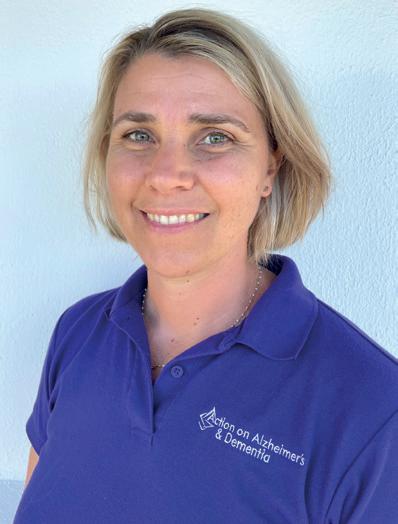
This is why the island’s soaring dementia rate, predicted to triple to 9,000 patients in the next 25 years if not adequately tackled, is just the tip of the ominous iceberg looming in our future.
Fortunately, according to the local experts, it doesn’t have to be this way.
With a collaborative approach involving charities, the government and insurance companies, they believe the island could reduce the rate of dementia and lessen its impact on patients and their families.
“This is not going away. There is no cure. We have to do something,” says Erica Fulton, executive director of Action on Alzheimer’s & Dementia in Bermuda.
“Yes, it is going to cost money and necessitate care pathways but, if there is a concerted effort between all parties, we can see a way forward. We are all in this together.”
Firstly, though, how serious is the current situation in Bermuda?
The current figure of 3,000 patients is an estimation because there are no official statistics, but Marie Fay, a care specialist with NorthStar Dementia, has copious amounts of anecdotal evidence.
“I’ve been back in Bermuda for 11 years. What started off as a part-time role has completely exploded into the need for a whole team to service this population,” Fay says.
“We are seeing it with the work we’re doing in the community and with a definite increase in referrals without any advertising.
“The severity of cases is increasing as well. I have seen a couple of people in the past few months who didn’t have running water in their homes. It’s shocking to see some of the situations that some seniors find themselves in after they fall through the cracks.”
The global group Alzheimer’s Disease International predicts the number of international cases will triple by 2050 and, with its ageing population, Bermuda is right in the line of fire.
Fay and Fulton are thankful that the government has now embarked on a data collection programme, which they believe will reflect what they have already observed.
“It’s primarily female black Bermudians that are being impacted,” Fay says.
“Not just from a disease standpoint, but also the caregiver role tends to fall to black Bermudian females.
“More females are diagnosed with dementia than men. Our statistics also reflect that it is usually a younger generation female that takes on the primary caregiver role. We are trying to raise awareness that this disease doesn’t just impact the individual. It is much further reaching.”

Fay estimates 80 per cent of dementia care in Bermuda is provided by family members who are not reimbursed for their caregiving role and are juggling other life responsibilities.
“They are holding a full-time job, they are raising children, they are also trying to care for ageing parents as well,” she says.
“Dementia is an extremely challenging condition to care for. There is no cure, there is no magical medication.

Health & Beauty Summer 2024 8 SPECIAL REPORT: DEMENTIA
Erica Fulton
Marie Fay

9 Health & Beauty Summer 2024 SPECIAL REPORT: DEMENTIA
SPECIAL REPORT: DEMENTIA
“The person with dementia can become agitated or aggressive, they may wander from their home. There’s a whole range of different challenges that we see. These can be extremely difficult for family caregivers to manage. They are experiencing caregiver stress and burnout.”
AAD and ADI launched a campaign, #WhatsYourPlan, earlier this year to urge the Government to adopt suggestions from the World Health Organization including: improving awareness, research and education; reducing risk factors; better diagnosis, treatment and care; and more support for carers.
Asked what difference we could see, Fulton says: “The first thing would be a timely diagnosis.
“We have heard anecdotal feedback from GP’s who say, ‘If I diagnose, then what? If I see a family sitting before me who are already stressed, if I give them a diagnosis, they’re still not going to get any funds, it’s just going to add to the whole issue.’
“A timely diagnosis can be followed up with a clear pathway of support. People can often be physically healthy apart from the diagnosis and they can live for years. It’s about trying to make sure the people around them are educated as to how best to support them, as happily as possible, in the home setting.”
Fay says the lack of a timely diagnosis leads to a reactive approach of “putting out fires”.
“People call us when they’re in crisis,” she says. “That’s not ideal. They need to be calling us a year before.”
Part of the reason for the delay is the stigma.
Fulton says: “There can be a sense of total shame around it. You don’t hear people talk about dementia unless they’re talking about someone who is very old.
“I know my parents are absolutely terrified. For my dad, it’s the absolute worst thing that could happen to him. What we often envision is someone sitting in a corner drooling, having to be cared for, and feeling that you’ve created this burden for your family because you could go on for years like that.”
Better awareness would relieve the stigma in the way that it did for cancer 50 years ago, Fay and Fulton say. Improved education, of course, would also help reduce risk factors such as obesity, diabetes, hypertension, smoking, lack of exercise, poor diet and low levels of cognitive engagement.
“We need to understand the risk factors like we do with heart disease in our 20s and 30s. We need to be empowered about our brain health,” Fulton says.
“Even after you’ve been diagnosed with dementia, there are things you can do on a daily basis to slow the progression of the disease.”
Fulhon’s family have first-hand experience of the need for caregivers to get more support.
“My parents recently cared for my aunt. Every single meal they had to be at the house, they had to care for all her toileting needs,” she explains.
“It’s fine for a week, but they did it for three months and it was exhausting. But you could go on for years and years and years. In the end you don’t have your own life, so you have all the resentment and anger.”
Fay says that some jurisdictions have a clinical care pathway, meaning families receive support throughout the progression of the condition.
“We have absolutely none of that in place here, so the care received is dependent on the provider,” she says.
“We are asking our family members to do the impossible. Even when there is limited support, depending on your insurance provider, it’s nowhere near the 24/7 that these people inevitably require as the condition progresses.”
The Ministry of Youth, Social Development and Seniors has encouraged Fulton and Fay by collaborating and datagathering over the past few months, but they hope the next step will be a national plan with the Ministry of Health on board. There’s clearly no quick-fix solution when, for example, a small change to insurance policies would invite a tsunami of claims.
But Fay says: “This is not a problem that is going away. By not proactively planning, we are creating greater stress in the health system and increased cost.”
Dementia and Deception: A Bermudian Family’s Cautionary Tale
It doesn’t matter how sensibly and practically you’ve lived your life, when you’ve got dementia, you’re a target for those who prey on the vulnerable.
One Bermudian family learnt that lesson the hard way when they discovered their mother, who they describe as “the epitome of a strong woman”, lost $40,000 to online fraudsters.
The mother – in her 70s and in the relatively early stages of Alzheimer’s, the most common form of dementia – was conned by a fake Facebook account claiming to be from an orthopaedic surgeon in the Middle East, who said he needed the cash so he could fly to Bermuda to marry her.
The daughters say it happened after her husband had passed and she changed her Facebook marital status to “widowed”.
“She seemed like her normal self except for some forgetfulness,” says one of the daughters.
“Then out of the blue she’s telling us she’s lonely, which we understand. The next thing we know, she’s sending money to these people.”
The mom, who asked not to be identified in this article, had never shown any signs of gullibility.
“My mother doesn’t believe in psychics or astrology but then all of a sudden she started getting into websites saying how to find your soulmate through astrology,” the daughter says.

“Sometimes she was aware that this was likely a scam. She would Google ‘is this a scam?’. But then the next day she had forgotten what she had Googled, and it would happen again, and she would get scammed again.”
The daughters monitored their mother’s social media activity and tried to explain to her that, if the surgeon was genuine, he wouldn’t need cash for plane tickets.
But as the fraudster continued to send love songs and poems, the mother acted “like a lovesick teenager”. To avoid detection from her daughters, she created another Facebook account
10 Health & Beauty Summer 2024
Social Interaction and Safe Spaces: Enhancing Quality of Life for Dementia Patients
Adementia diagnosis does not have to mean the end of the world.
With Cognitive Stimulation Therapy CST), a patient in the relatively early stages of the condition can delay its impact by improving their memory and thinking skills.
NorthStar Dementia Bermuda runs a six-week CST programme for people who have experienced a deterioration in memory or thinking skills and have received a diagnosis of mild to moderate stage dementia.
To take advantage, you just need to be able to independently attend two-hour group sessions and be willing to try new things.
Items on the agenda include discussing current news stories, activities expressing creativity and practical tasks required for independent living. The idea is to stimulate thinking, memory and social skills while giving patients the chance to connect with others experiencing memory issues.
Care specialist Marie Fay, who runs the course, says the benefits go beyond the therapeutic impact.
“If people just sit at home on their own and lack the enthusiasm to get out, their decline happens more quickly,” she says.
“We know that social interaction, getting out of the house in a safe space and building an informal support network will help improve the quality of life.
“It’s a very popular programme and gets fully subscribed.”
Caregivers can also get help from NorthStar Dementia’s free Compass Guide to Dementia Care, which is designed to improve knowledge of the condition and address caregiver
– but then a family member spotted she had posted a strange photo of herself sending a letter by FedEx.
“We dug a little deeper and found out she had sent close to $40,000,” the daughter recalls. “We transferred her nest egg to another account and just as we were doing that she was at the bank, about to transfer another $5,000.
“But there are many seniors who don’t have anyone to look after them. They could lose their house, everything.”
The daughters say they would have acted more quickly if they had a better understanding of Alzheimer’s, and believe their case highlights a lack of awareness of dementia in Bermuda.
“We would have been stricter about monitoring those accounts and would have gotten an attorney,” the daughter says.
“At first, we were told she had cognitive decline, but we thought OK, that means she’s getting old. Then one doctor told us that’s just a nice way of saying dementia and that just flipped our whole world upside down.
“I just really wish there was more awareness because it’s going to get worse for us, for my mom, for overall society.”
Coming to terms with their mother’s changed personality has been one of the hardest parts of caregiving.
“Our mother was always like Mother Teresa,” the daughter says. “She doesn’t do bad things. She doesn’t have a bad bone in her body.”

self-neglect.
For more guidance on dementia and caregiving, visit: northstardementia.bm or Action on Alzheimer’s & Dementia’s website: www.aad.bm
“But we noticed she would say different things to family members that was completely out of character. She would lie through her teeth and be manipulative and deceitful.
“I’m already mourning the loss of my mom’s soul and spirit because she has changed so much. She even has a different laugh.
“As caregivers you have also got to take care of yourself. We share it. We are struggling. We are at the point now where she is taking care of herself, but she has to be monitored but with the unknown.”
Marie Fay, a care specialist with NorthStar Dementia in Bermuda, has observed increasing cases of fraud against dementia patients over the past decade.
“Unfortunately, the perpetrator is usually a family member or someone known to the person living with dementia,” Fay says.
“People with dementia are extremely vulnerable, especially in the early stages, when presentation can be less clear, and families may not pick up on behavioural changes and may not be aware enough to look out for potential risks.”
Signs to look out for include being overly generous with their money, gifting money to strangers, sharing personal or financial information inappropriately.
Cases of financial abuse should be formally reported to the Registrar for Senior Abuse through the Department of Ageing & Disability Services.
Health & Beauty Summer 2024 11 SPECIAL REPORT: DEMENTIA
Clean Beauty, Clear Oceans:
Eco-Friendly Skincare by Headway
At Headway Hair & Body, we continue to source clean, organic, cruelty free, products that will benefit our island habitat, as well as maintain your most youthful, healthy self.



What a great idea — clean skin and clean oceans. In Bermuda, we spend a lot of time outdoors and in our oceans. All of Jane Iredale SPF products are reefsafe, chemical free and water resistant, and can even be used on sunburns to help calm the skin. We’re so proud to be providing skincare makeup that’s good for you and good for our ocean’s coral reefs.
Jane Iredale uses reef-safe sunscreen protection in all their mineral powders. Karin Herzog Swiss Facial line was
chosen for its patented active oxygen qualities along with being hypoallergenic, vegan friendly and paraben free.
The Malina smoothing line for hair, is also plant based, fume free and cruelty free, with plant derived keratin, a win–win all around for our skin, hair and the planet.
Tel: 292-8983. www.headway.bm www.Facebook.com/headwayhairbody
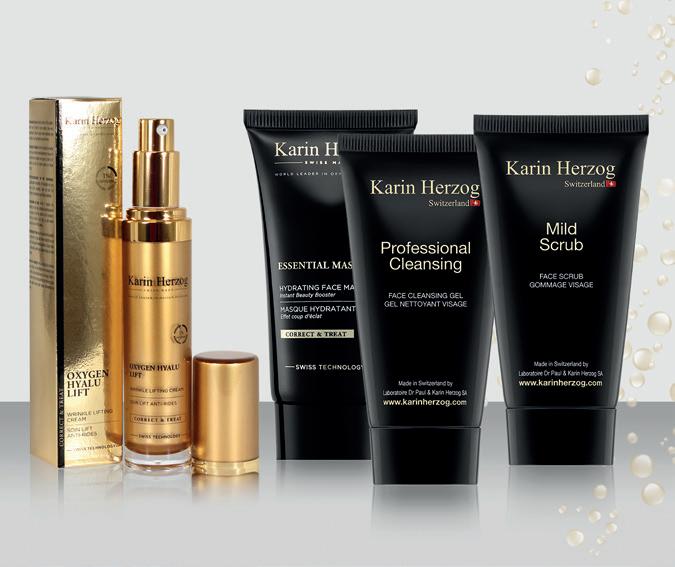
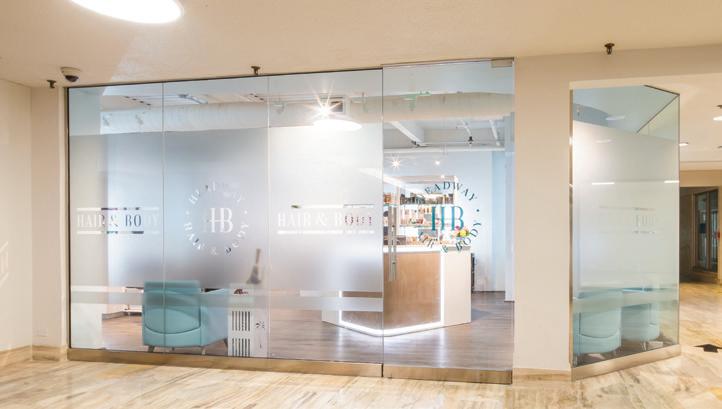
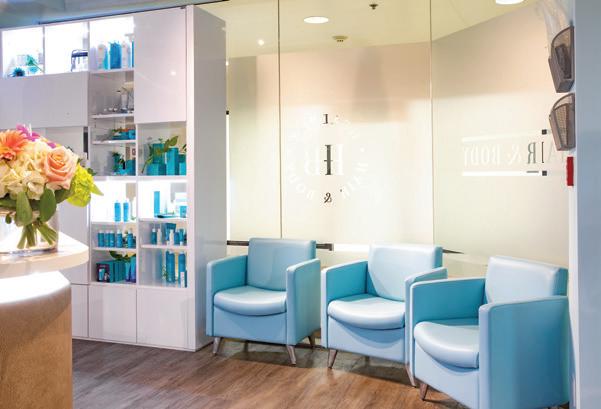
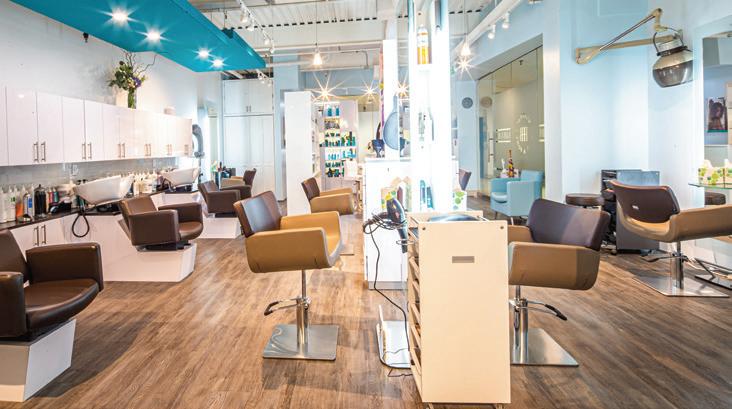
12 Health & Beauty Summer 2024 SKINCARE
WE ARE HAPPY TO HAVE SETTLED INTO OUR NEW SPACE AT THE TOP OF THE STAIRS IN THE WASHINGTON MALL AND OUR CLIENTS ARE LOVING IT!
ALWAYS, WE ARE DEDICATED TO PROVIDE FIRST CLASS SERVICE, USING THE FINEST PRODUCTS AVAILABLE MANY OF OUR PRODUCT LINES ARE GREEN, CLEAN, ORGANIC AND CRUELTY FREE. * JANE IREDALE * KARIN HERZOG OF SWITZERLAND * TANINOPLASTY * SUNFX * SEMI PERMANENT MAKE-UP * EYELASH EXTENSIONS * OLAPLEX * MOROCCANOIL * OUIDAD * TIGI www.headway.bm CALL NOW: 292-8983 www.Facebook.com/headwayhairbody
Washington Mall, Upper Level, Hamilton HM 11
AS

15 Years of TLC Homecare
TLC Homecare Ltd., founded as LTC Solutions Limited on February 11, 2009, proudly marks over a decade of committed service to the Bermuda community. Having rebranded in 2017 to TLC Homecare Ltd., we continue to evolve, strengthening our offerings to meet the changing needs of our clients with utmost dedication and professionalism.
Since our inception, TLC Homecare Ltd. has been at the forefront of delivering personalised care plans, integrating services by certified nurse associates (NA), companions, and registered nurses (RNs). Our adaptive approach ensures that each client receives tailored care that assists them at every stage of life.
TLC Homecare Ltd. offers an extensive range of healthcare services to meet the diverse needs of our community. We provide supportive assisted living and specialised elderly care that honors the unique needs of our population. Our palliative care service provides comfort and dignity during the most critical times. Recognising the importance of continuous care, we offer post-discharge care to ensure a smooth transition from hospital to home. Our respite
care services provide a reliable support system for family caregivers needing a break.
Additionally, we offer private nursing services, delivering personalised and professional healthcare directly to our clients’ homes. We collaborate with allied health professionals to craft individual care plans, which are continually adjusted to meet our clients’ health needs.
Our dedicated team also collaborates with local physicians to monitor ongoing
health conditions, ensuring seamless communication and continuity of care. It is our privilege to serve the Bermuda community. Our mission is to ensure that every client enjoys independence and a high quality of life through comprehensive, compassionate, and tailored healthcare solutions right in their homes.
If you wish to know more about the TLC approach, visit www.tlchomecare.bm Call 441-296-9999. Email: office@tlchomecare.bm

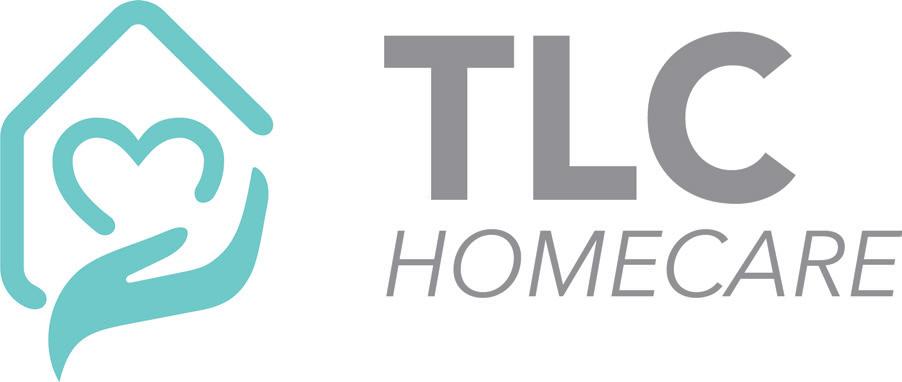
Tel: 296-9999, email: office@tlchomecare bm www tlchomecare bm
TLC Homecare Ltd. celebrates over 15 years of Dedicated Service to Bermuda’s Community, Providing Expanded Services and Care Solutions for families across the island.
TLC Homecare Ltd. is dedicated to providing ‘Tender Loving Care’ to the Bermuda community, enabling clients to maintain independence and enjoy a high quality of life in their own homes From foundational homecare to complex health management, TLC Homecare is a pillar of support and excellence in home-based health services
13 Health & Beauty Summer 2024 HOMECARE
◆ In Home Assisted Living ◆ Elderly Care ◆ Certified Antigen Testing ◆ Respite Care ◆ Companionship ◆ Palliative Care ◆ Nursing Care Management ◆ Transitional Care to Home
Left to right: Yolande Snyman, Lindsay Donovan, Shannae Cumberbatch, Mary Jo Farrow

Diet vs Exercise
Why eating less is far more important than exercise for losing weight
You’ve likely noticed the various promotions for fitness challenges, gyms, and personal trainers. These initiatives have undoubtedly inspired many Bermudians looking to shed a few pounds—or more—to take charge of their health and improve their well-being, which is a positive step forward.
But the emphasis placed on exercise to lose weight can lead some people to believe that running, walking, cycling, or a workout at the gym is all they must do to achieve a healthy weight. What should
be emphasised is that what you put in your mouth is far more important than how far you jog or swim if you want to lose weight.
Simply put, we lose weight when we eat fewer calories than we use up; we gain weight when we eat more calories than we use.
For example, one donut can contain 200 to 300 calories. A rule of thumb is that you must walk a mile to burn 100 calories, so it would take a three-mile walk to burn off just that one donut. We
are talking averages here, and as they say, results may vary. But the lesson is that exercise burns far less calories than you might think.
Now what if you add a can of soda, ice tea, energy drink, or iced latte – any of which could easily add up to another 200 calories? You would have to walk five miles a day to burn off those empty calories. How many of us could keep that up every day? Would it not be easier to completely eliminate junk foods from your diet?
Health & Beauty Summer 2024 14 LIFESTYLE
And remember, there is no nutritional value whatsoever in a donut or can of Coke. And we haven’t even started to discuss burning off all the other calories you have consumed during the day.
Exercise is important, and this article isn’t suggesting you exercise less – far from it. Exercise is critical to improving your overall fitness, cardiovascular health, and to help control all manner of conditions, from diabetes to depression. It’s wonderful to see so many Bermudians out in the pre-dawn hours running, cycling, and walking on our roads. Just don’t rely on this to help you lose weight.
A recent study in the United States revealed “little evidence of the more physically active members of a population gaining less excess weight than those who are the least physically active.”
Many other studies have concluded that being active is not the most important element in whether a person gains weight or not. Medical explanations can be complicated, with detailed discussions, for example, on how multiple hormones can acutely suppress or stimulate food intake. One of the side effects, for instance, is that, in some people, exercise can make you feel hungry and increase your appetite.
Calorie expenditure through exercise is relatively small in the grand scheme of things, as we use up calories just staying alive and going about our daily business. Also, research has demonstrated that people notoriously underestimate their calorie intake per day and vastly over estimate the calories expended during exercise.
When you’re trying to control your weight, experts suggest that 80% of your focus should be on what you eat, and 20% on your workout routine.
In a practical sense, this might mean taking more time to make healthy selections when you shop at Lindo’s and to prepare that food in a healthy manner in your own kitchen – as opposed to picking up KFC on your way home. If the additional time spent on preparing a healthy, home-cooked meal means spending less time exercising, then that would be a good trade-off if your overall goal is to lose weight.
The best way to approach healthy eating is to think of it as a lifestyle change. It doesn’t have to be rigid and punitive. Take a long-term approach. For example, you could choose to lose two pounds a month, which at the end of the year adds up to 24 pounds of weight loss.
Experiment with different types of healthy foods and find the ones you like and enjoy. You’ll need to like the life
LIFESTYLE
you live if it’s going to be sustainable for you in the long term. Diets in books and online are unlikely to be perfectly suited to you, but you could use them as a starting point or template, then do your own reading and research to customise what you eat to your own tastes. Ask yourself if the way you’re eating is something you could do forever. If the answer is no, then make a change. Look for some other healthy foods or try preparing the healthy foods you’re eating in a different way.
Cutting down on portion sizes will also help tremendously in reducing your calorie intake. Using a small plate for your meals is an effective strategy. Human nature is such that we get more enthusiastic about starting a new fitness regime than we do about cutting down on what we eat. But if you can motivate yourself to eat less and choose more healthy foods, you’ll find yourself naturally leading a healthier and more active lifestyle.

15 Health & Beauty Summer 2024















































